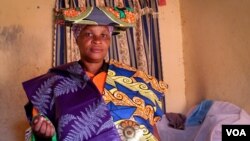Charlotte Mapendo spends nearly every day walking the streets and dusty alleyways of her adopted home, Kampala.
She carries folds of colorful Congolese kitenge cloth on her head, selling the fabric as she goes.
Mapendo fled her native Democratic Republic of Congo two years ago after rebel soldiers killed her husband and knocked out her front teeth. She arrived in Kampala with nothing but the clothes on her back.
A new report by the Refugee Studies Center at Britain's Oxford University found that refugees like Mapendo can have a positive economic impact on their host countries, if given the chance to work.
The report focuses on Uganda, where 99 percent of refugees earn their own incomes. The vast majority of urban refugees, it found, receive no international aid at all.
Mapendo said she started her business by selling the kitenge she was wearing around her waist, using the little money she made to buy more.
Right now she only sells enough fabric to feed her five children, but she hopes eventually to scrape together the capital to open a small shop.
Refugees receive no aid
Yusrah Nagujja, of the Kampala-based Refugee Law Project, explained that Uganda's policy requires urban refugees to support themselves.
"They are self-sustaining. Yes, they might be staying in dingy areas and in the slums, but they are paying rent. So how are they able to pay this rent? Because no organization is paying rent for them,” Nagujja said.
This, she said, forces them to be industrious and resourceful.
Many survive by selling cloth or jewelry, or by braiding hair. Some manage to grow their businesses to the point where they employ other refugees, or even native Ugandans.
Nagujja said the Somali refugee community in Kisenyi, a neighborhood in Kampala, is a good example of how successful they can be.
"They are operating small businesses like selling perfume or selling beauty products, or selling tea or food. Most of the petrol stations are operated by Somalis. They have big shops, they have butcheries,” she said. “Basically, when you go to Kisenyi, business is for the Somalis."
But not all refugees’ businesses focus on trade.
Uncertain about future
Joshua Gato is a Congolese refugee who has been living in Uganda for the past 18 years. He earned a university degree in Kampala, and now works for an organization helping other refugees to adjust.
"I work as a community interpreter. You know, refugees from the eastern part of Congo and Congo as a whole don't know English. I also help in teaching these refugees the English language,” Gato said.
But despite the opportunities Uganda offers, Gato said, he is still classed as a refugee, and will always be considered a foreigner.
He lives in fear that everything he has built for his family could be taken away.
"The law does not allow me to buy land. The children don't see any future, because I cannot plan. We are afraid that at any time they can say, 'OK, refugees go back.' And that's where the problem will come again, because I will not know where to go,” Gato said.
He said he hopes that someday Ugandans will recognize what refugees contribute to the country.
Uganda should offer more than just a chance to work, he said: it should offer them a future.




